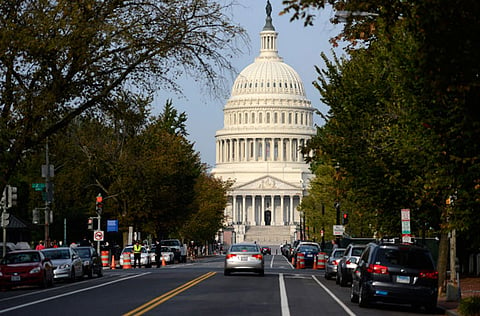Fiscal cliffs threaten fragile US recovery
Republicans and Democrats remain at a standstill on number of issues

Also In This Package
Washington: Policy makers in the US will resume contentious talks this week on another round of stimulus that could prove critical to the still-fragile recovery of the world's largest economy.
With much of the last stimulus poised to run out in the coming weeks, the US Senate will return to Washington, D.C. to negotiate legislation about how much and where to spend in additional relief for the coronavirus crisis.
Republicans and Democrats remain at a standstill on number of issues, including whether to include a payroll tax cut, which President Donald Trump has insisted should be included. House Democrats have already approved a $3.5 trillion bill, while the White House has said the final package shouldn't exceed $1 trillion - a sign of how far apart policy makers are.
These looming cutoff dates, or so-called fiscal cliffs, come as the pandemic rages across the country and amid signs the labor-market recovery may be stalling.
The US will report new data on Thursday about the number of Americans on state jobless benefits, and it's likely the figures will remain high as millions of people continue to be out of work. Last week, the number of people filing for unemployment barely declined and the data is at risk of worsening when the current benefits expire at the end of the month.
"We expect negotiations will result in a package much closer to the $1 trillion floated by Republicans. Aid around this size would not on its own derail nascent recovery if heavily targeted at a short horizon, but less generous fiscal support stands among the reasons we expect economic rebound will weaken substantially in coming months," said Andrew Husby, Bloomberg's US economist.
Europe, Middle East and Africa
Flash purchasing manager index readings for Germany, France, the euro area and Britain on Friday are set to provide an initial glimpse on the state of the economy in June.
Jonathan Haskel, one of the Bank of England's policy makers who recently sounded more upbeat, gets a chance to publicly weigh on the latest data that showed the rebound to be much slower than initially anticipated. One of his colleagues, Silvana Tenreyro, has already warned that the recovery will look like an "interrupted V" by hitting a ceiling before the end of the year.
It's a very busy week for central banks across the region. Hungary may deliver another 15-basis point cut after a surprise reduction in the benchmark interest rate last month. In Ukraine, the monetary authority takes a decision after the governor's shock resignation: While there's room for another cut, analysts expect the benchmark will be left unchanged amid uncertainty over risks to the central bank's independence.
Turkey - which has reduced rates by 375 basis points this year - will probably pause on Thursday. In Russia, the central bank governor left the door open for more possible easing on Friday after cutting the benchmark to a historic low of 4.5% last month.
With inflation that's picking up and a currency that was devalued this month, Nigeria will probably hold its benchmark rate on Monday. On Thursday, South Africa could add to the 275 basis points of cuts it has announced in 2020, though any move will be small.
Asia
Trade figures from Japan, South Korea and Thailand will give a snapshot of how the pandemic is unfolding in Asia's export-reliant nations. South Korea's GDP data at the end of the week will likely show a hit to growth in the second quarter. In Australia, the central bank governor may strike a more cautious tone when he speaks on Tuesday, given recent spikes in infections, and on Thursday the government will disclose its fiscal plans in a budget update.









